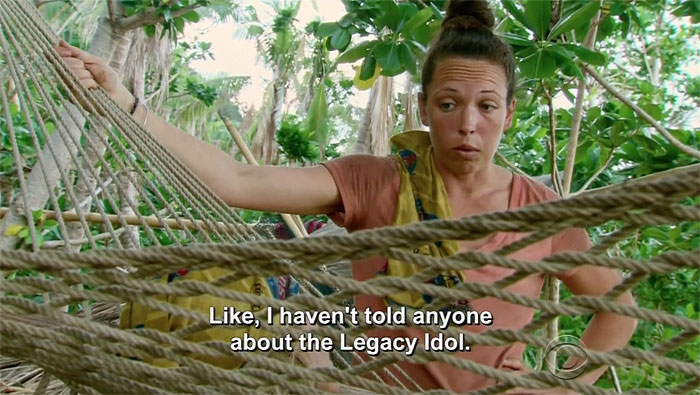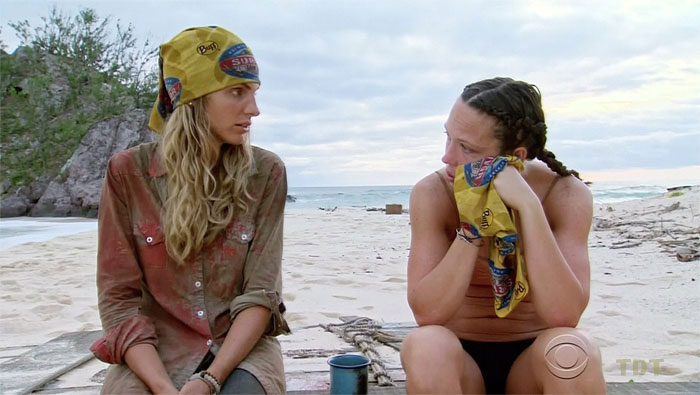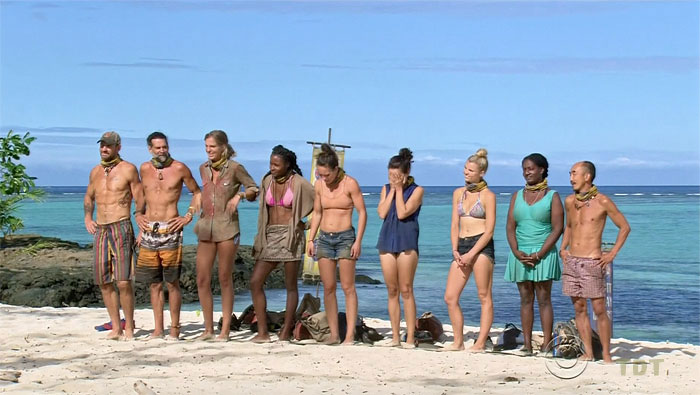

I’ve been watching and reading about Survivor long enough to know many people view sharing information as a form of building trust. Heck, one of my favorites, Stephen Fishbach, often talks about how revealing information can be a form of bonding, or trust-forming.
And he’s right, but these things are completely situational on Survivor. If someone, like Stephen did in his first season, finds an idol and immediately tells his alliance then, yes, that can bring people together. But Sierra this week? Um, no.
There is a clear argument that Sierra just said too much. You could say that if she told Sarah about the advantage, but not about being able to will it, she would still be around. I don’t agree. Once Brad won immunity, Sierra was a goner.
In social psychology, there is a theory of swift trust. As you can imagine, trust is a commonly studied concept in psychology. The vast majority of the research on the subject, especially early on, identified time as a driver of trust. This is common sense, right? The longer we know someone and can see their behavior and judge it “trustworthy,” the more we trust them. It’s almost impossible to simply trust someone we’ve never met.
In our daily lives, we probably are all in some ways wary of new people. We only trust them after a certain amount of time. But in some situations, this isn’t possible. For example, when we start a new job, we almost have to trust the people we meet. Over time, we might lose trust in some coworkers and gain immense trust in others, but we simply need to trust at first.
And that’s where swift trust theory comes in. Researchers needed a way to understand how members of an organization or a team gain trust with each other quickly. You can see where I’m going here, right?
In Survivor, castaways are forced to trust others even though those others, in most cases, have done nothing to earn that trust. Or sometimes, they’ve actually done things to actively make you distrust them.
In swift trust theory, the idea is that swift trust is formed both normatively and cognitively. The cognitive parts of the theory basically presuppose that we base early relationships on social categorization. We’ve talked about this before with social identity theory. Fundamentally, when we’re forced to trust people without the benefit of time, we gravitate more toward people who are like us. Sierra sees the other alliance and, for a variety of reasons, probably thinks Sarah is the most like her. This categorization began at the beginning of the season.
The normative portion of the theory basically argues that if people follow social norms, trust will continue. But when they violate those norms or when they give others a reason not to trust, well, then, they won’t.

Here’s my feeling on this particular interaction between Sarah and Sierra: Sarah wanted to trust Sierra because they’re similar (the cognitive thing). Sierra even did something that should make Sarah trust her more (the normative thing, i.e., telling secrets). Yet because the two did not have any long-term, earned trust but relied instead on what we’d call swift trust, Sarah is looking for any reason to break that bond.
The bond – the swift trust – is broken between the two for a variety of reasons. First, Sierra tells Sarah she found the advantage early in the game. Sierra also tells Sarah about how she has to will the advantage after her exit. Again, Sarah wants to trust Sierra, but the willing thing gives Sarah a reason to rationalize breaking the trust. And that she does.
Trust is often talked about in Survivor. Oftentimes, we hear castaways talking about how they can’t trust someone. That’s because they’re forming swift trust and without the benefit of time, any violation or perceived violation gives someone a big reason to rationalize not trusting. That’s why we so often see people get voted out just for talking to someone else. That’s why Andrea calls out Zeke for talking football with Brad. It’s super easy to break swift trust.
That’s why Sierra’s home now, partly. And as we head into the penultimate episode, here’s what I think is happening:

- Michaela — You know, there was a moment during last season where Michaela truly looked like she could be an exceptional Survivor player. She seemed to have decent strategic chops and, of course, she excelled in challenges. But, man, where did this season come from? Or did the editing last year carefully conceal her considerable weak spots? Every exit interviewee talks about how Michaela was very hard to live with. Her emotional meltdowns are teenager-like. She’s shown not even a wee bit of quality strategy this season. Heck, Monica Culpepper deduced Michaela’s game in a whopping 14 seconds. I have a feeling Michaela is a zero vote getter at final tribal. Why would anyone eliminate her at this point?
- Tai — There are now eight people left and Tai still sits with two idols. And, as of right now, I wouldn’t think he’d be in danger next week. Both Brad and, of course, Andrea look like targets from all sides right now. As per usual, I’m not sure Tai can win this game, but, you would think, he’s at least assured a spot in the final episode and, maybe, final immunity challenge.
- Aubry — Aubry remains in a very good spot to once again make the end this season. But, unlike her previous run to the end, it doesn’t look like she actually can win this season. But, you know what? In Kaoh Rong, I didn’t think there was any way Aubry could lose if she got to final. This season, I don’t think there’s any way she can win. Follow my logic? I’m an idiot, so maybe Aubry wins it all?
- Cirie — For Cirie to win this game, I think, she needs her alliance to stay strong and she needs to eliminate Andrea at final four. It would also help if Sarah is gone by then too. A final three of Cirie, Michaela and Aubry would be ideal for the four-time player. Cirie’s teaming with Andrea worked out perfectly in that, somehow in a season full of good players eliminated too early, she’s been able to move under the radar a bit.
- Andrea — And speaking of Andrea, she once again looks like a potential target and once again, ahem, survives. It’ll be a hugely long road to win this game, though. Fundamentally, for Andrea to win, I see her having to earn a few immunity necklaces along the way. She can do it, but I don’t think she will.
- Troyzan — Well, I know it’s late in the game and you want immunity for yourself, but I think Troyzan might have missed his opportunity to make a Big Move™ and win. If he gave his hidden idol to Sierra, it might just have catapulted him into a position of power. As it stands now, Troy might make the end, but if he does, I would think it will be perceived (accurately) that someone else dragged him there.
- Brad — That’s two weeks in a row editors have gone back to the whole, “Let’s show Brad Culpepper in an amazingly positive light” theme that was so prevalent earlier this season. If Brad can make the end, he certainly would have a case to win, but the big question would be whether a jury would reward a rich dude. I would hope, if he deserves it, they would, but, man, this is a bitter season.
- Sarah — For the first time this season, in my opinion, editors credited a Big Move™ to Sarah alone. In other episodes where it looked like Sarah did something, editors made clear that Cirie or Andrea actually drove the move, making Sarah kind of look like a follower. But her masterful play on Sierra was clearly credited to Sarah and the fact that she now owns the Legacy Advantage could be huge.
Well, OK, only two episodes left. Does that mean we’re getting a double elimination this week? I would think so. My prediction? I’m thinking we’re going to lose Andrea and Brad this week. That will leave us heading into the finale with Sarah, Cirie, Tai, Troy, Aubry and Michaela. Besides Cirie, that’s not what I would have hoped for at the beginning of the season, but it could make for a good last episode. Let’s just hope I’m wrong about the two going home this upcoming episode, though.
 Pat Ferrucci started watching Survivor when Episode Two of Borneo first aired. He's seen every episode since. Besides recapping here, he'll be live-tweeting this season from the Mountain Time Zone. Why? Because nobody cares about the Mountain Time Zone except when they want to ski. Follow him @patferrucci for Survivor stuff and tweets about anything and everything that enters his feeble mind.
Pat Ferrucci started watching Survivor when Episode Two of Borneo first aired. He's seen every episode since. Besides recapping here, he'll be live-tweeting this season from the Mountain Time Zone. Why? Because nobody cares about the Mountain Time Zone except when they want to ski. Follow him @patferrucci for Survivor stuff and tweets about anything and everything that enters his feeble mind.
- S34 Well, in theory... index
- Cast: And the winner? I don't know?
- Eps.1-2: This cast is sure primed for fun
- Ep.3: Organize differently and boom, different culture
- Ep.4: Producers innovate, but it's unfortunately disruptive
- Ep.5: To compare or not to compare
- Ep.6: The drive to boot Sandra
- Ep.7: With the merge comes power rankings
- Eps.8-9: Booting Hali the rational choice
- Ep.10: Sarah revolts against dominance
- Ep.11: Don't rock the boat - we like it stable
- Ep.12: Do it and do it swiftly
- Ep.13: Where do we stand? A look at the Final 6
- Pre-Ep.14: Jury jeopardy